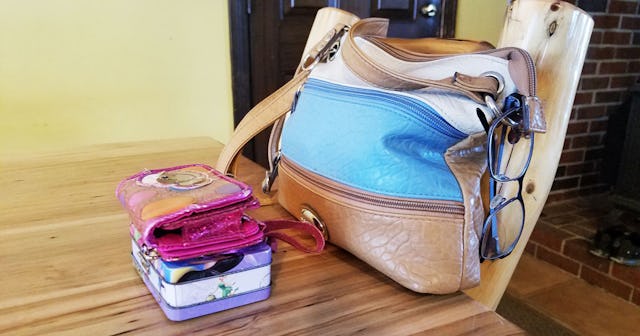My Daughter Has Developmental Trauma Disorder

“Mom. Wait. I am getting my stuff, too.” Her voice was peaceful, not agitated, appropriately mildly excited.
She said this as though it were as typical as a daily routine, as natural as the sunrise, as expected as the season’s change.
It wasn’t, though.
Last year in June, near the end of kindergarten, when other six-year-olds were maybe having pool parties at their houses, or getting off the bus at friends’ homes, or playing t-ball with kids who understood social norms, she called me a “fucking stupid mother.”
She did that twice, actually. In less than a month. One of those times punctuated by throwing her sparkly size 11 sneakers at me in our hallway, and slamming her door in my face, her 40-pound body shaking with fury.
Once, in July, we were driving home from dropping one of my other kids off at a junior volunteer program at a hospital, and she slammed her fist into the window next to her in the backseat of my Highlander repeatedly, let drool run out of her mouth while staring at me in the rearview, head tilted down, ferocious rage in her brown eyes, and made obscene gestures for the sixteen minute ride home. I recorded it all to show her psychiatrist later in the month.
The Good Brigade/Getty
It hurt to rewatch.
That is the shocking face of developmental trauma disorder, of reactive attachment disorder, of what can happen as a result of early maltreatment. It is unnerving, nauseating, chilling to witness.
She’d been home for four years at that point.
The summer she’d been home for only four months, she bit my older daughter in the grocery store, threw marbles at my nine-year-old son hard enough to bruise dark purple and black around his eye, pulled our cat across the floor by his foot, hit our dog with a stick.
We were scared. And we were angry.
And we held on.
But there were minutes in between. Minutes in between the chaos and the screaming and the hitting and the insults hurled at us while stomping up our stairs.
Courtesy of Sarah Burtchell
There were minutes where she asked us to help her with something in a sincere voice with no hint of a growl or hiss, where she held the door open for our cat and waited until she was fully inside the house before closing it carefully. There were minutes where she laid on her bed in that new bedroom on pine green sheets, and stared out her window at the full trees and the bright sky, and looked somewhat peaceful.
More frightening things happened. They still do today.
It’s been a long time now. Five years and four months since she was dropped off in Maine, three old Rubbermaid containers holding all of her belongings, half of the toys broken and most of the clothes sizes too small. Five years and four months since she began sleeping in our only unoccupied bedroom, states away from the state in which she was born, states away from where she was shuffled between homes for weeks, months, years.
People sometimes ask me how living in foster care for only two and a half years can severely damage a child. I sigh a lot. I look down a lot. And then I try hard to explain, because I believe that understanding goes a long way toward patience. Two and a half years is 30 months, which is nearly 1,000 days, and almost 24,000 hours.
Imagine ignoring a baby when she whined or fussed to be held or fed for 1,000 days in a row.
Imagine shutting that door and leaving him to “cry it out” even twice a day — 2,000 times over those years.
Possibly hundreds of opportunities to be held, cuddled, connected, reassured — missed.
Dozens and dozens of moves — strange new social workers picking him up in unfamiliar arms, placing her in cars with strange, new smells, driving him to unfamiliar homes, putting her again into strange, new, just as unfamiliar arms.
Developing brains alter according to the anxiety with which they live, cortisol levels skyrocket, kids learn to stay alert, to never relax, to hyper-react to anything remotely stress inducing. Their neurology changes irrevocably.
This summer she has worked with a behavioral health professional twice a week. She has screamed at that woman, sprinted away from her, thrown things in her car, sprayed sunblock all over two rooms while running from her, hissed and growled at her repeatedly.
Anxiety.
If I could somehow calm her hammering heart rate, regulate her erratic, shallow breathing every time she starts to become dysregulated with just words, her life would be markedly different. If the medication she takes were effective in every situation, her life would be so much better.
I hope someday she can recognize her own feelings of overwhelm and step back, step away, take a breath, take a break, and choose not to cause the destruction and chaos which mirror her feelings, but have a safe method to alter her own emotional regulation.
Today, and this week, and this month, and this entire summer she hasn’t called me anything terrible even once.
We celebrate the minutes in between.
The minutes in between show us the possibility.
The minutes in between show us the hope.
“Mom. Wait. I am getting my stuff, too.”
This article was originally published on